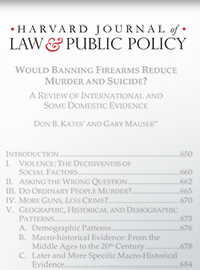| Harvard Law Journal Study: Fewer Guns Don't Mean Less Crime |
 |
|
By Timothy H. Lee
Thursday, April 07 2016 |
When itemizing Second Amendment intellectual redoubts, Harvard Law School rarely comes to mind. Across America, record numbers of everyday Americans possess firearms, a record number of states have relaxed their firearm restrictions and public support of the individual right to keep and bear arms remains at historical highs. Insulated urban and academic centers like Harvard, however, remain stubbornly resistant to the realities accepted and even embraced by most Americans.
But perhaps even those pockets of resistance are coming to terms with the facts, like isolated Japanese troops discovered years and even decades after World War II. In a Harvard Journal of Law & Public Policy paper receiving sudden increased currency, criminologists Don B. Kates and Gary Mauser examined worldwide data in their study entitled "Would Banning Firearms Reduce Murder and Suicide? A Review of International and Some Domestic Evidence." Lest readers be held in suspense, Kates and Mauser in their introductory sentence address "the mantra that more guns mean more deaths and that fewer guns, therefore, mean fewer deaths," which they observe has "all too often been afflicted by misconceptions and factual error and focus on comparisons that are unrepresentative." It only goes downhill for Second Amendment restrictionists from there. The authors first dismantle the suggestion that nations with higher rates of firearm possession suffer corollary higher murder rates: While American gun ownership is quite high, Table 1 shows many other developed nations (e.g., Norway, Finland, Germany, France, Denmark) with high rates of gun ownership. Those countries, however, have murder rates as low or lower than many developed nations in which gun ownership is much rarer. For example, Luxembourg, where handguns are totally banned and ownership of any kind of gun is minimal, had a murder rate nine times higher than Germany in 2002. "The same pattern," the authors note, "appears when comparisons of violence to gun ownership are made within nations." The study then notes an important point that remains overlooked within the gun rights debate. Namely, the authors address the misconception that Europe's comparatively low murder rates result from its firearms restrictions. "That attribution cannot be accurate," they respond, "since murder in Europe was at an all-time low before the gun controls were introduced." In fact, the authors highlight, the experience of England contradicts that suggestion: In the late 1990s, England moved from stringent controls to a complete ban of all handguns and many types of long guns. Hundreds of thousands of guns were confiscated from those owners law-abiding enough to turn them in to authorities. Without suggesting this caused violence, the ban's ineffectiveness was such that by the year 2000 violent crime had so increased that England and Wales had Europe's highest violent crime rate, far surpassing even the United States. In contrast, the study notes the opposite dynamic in America, where firearm possession has increased and legal restrictions across the country have been dramatically reduced. "The undeniable result is that violent crime, and homicide in particular, has plummeted in the United States over the past 15 years," the authors note. "The fall in the American crime rate," they add, "is even more impressive when compared with the rest of the world," where, "in 18 of the 25 countries surveyed by the British Home Office, violent crime increased during the 1990s." The authors proceed to consider various explanations for these realities, including tougher incarceration rates in the U.S. beginning in the 1990s, the fact that violent criminals denied firearms simply find other means to their murderous ends, the fact that law-abiding citizens so rarely commit violent crime that increasing or decreasing the availability of firearms to the general population does little to affect violent crime (rebutting the "ordinary people killing spouses in a moment of rage" myth) and the effects of rural versus urban settings. Importantly, the study also addresses the issue of suicide, which gun control advocates often raise. "Overall suicide rates," the authors conclude after reviewing the global data, "were no worse in nations with many firearms than in those where firearms were far less widespread." Accordingly, although the authors explicitly avoid analysis of the counterpart "more guns, less crime" dynamic popularized by Dr. John Lott and others, they conclude that the error of "fewer guns, less murder and suicide" is clear: [T]he burden of proof rests on the proponents of the more guns equal more death and fewer guns equal less death mantra, especially since they argue public policy ought to be based on that mantra. To bear that burden would at the very least require showing that a large number of nations with more guns have more death and that nations that have imposed stringent gun controls have achieved substantial reductions in criminal violence (or suicide). But those correlations are not observed when a large number of nations are compared across the world. That's a reality that most Americans already understood. But it's nice that even Harvard may be coming around. |
Related Articles : |
























